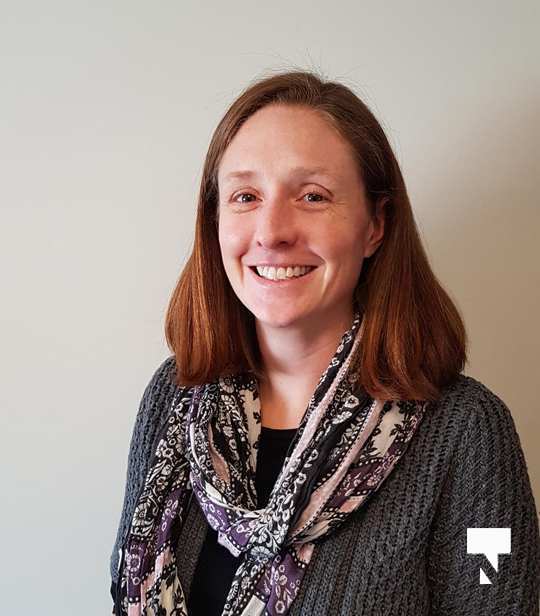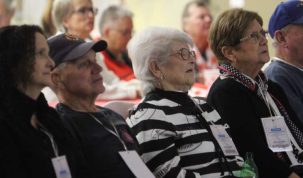By Cecilia Nasmith/Today’s Northumberland
The hard work of doing the right thing throughout the COVID-19 pandemic – which became even more onerous when the Omicron variant hit – is starting to pay off.
At this week’s media scrum, Haliburton Kawartha Pine Ridge District Health Unit Medical Officer of Health Dr. Natalie Bocking cited multiple indicators that COVID-19 transmission is decreasing.
“That’s something we have been hesitant to say for sure, but I do think we have multiple indicators that look like it’s moving in this direction,” Dr. Bocking said.
“We continue to have a decrease in the number of new lab-confirmed cases reported every day. We were seeing more than 100, and it’s down to 20 or 30 or so.”
The HKPR test positivity rate is down to 9.6%, from the 12% range where it sat for some weeks. This is slightly better than some neighbouring health units whose positivity rate remains in the high teens.
Across the HKPR jurisdiction, there are currently 184 lab-confirmed active cases.
“I emphasize the lab-confirmed component because these are individuals who have tested positive using the PCR test. It does not include people who might have a positive rapid-antigen test at home or have symptoms and are presumed to have COVID at home,” the doctor stressed.
Another indicator is how often they have had to send out their official notification letter to parents at schools where the absenteeism rate – from whatever cause – exceeds 30%. Of the 60 schools in the HKPR region, they have had to send home these absenteeism letters to parents at two of them.
Then there are the readings at the waste-water surveillance sites in Lindsay and Cobourg.
“Both, as of last week, had actually indicated a relatively significant decrease in overall mean viral activity,” Dr. Bocking reported.
“I think this is, again, leading to a much more overall-optimistic picture.
“I am quite hopeful these trends will continue in the downward direction. It’s possible, after some of the reopenings and raised capacity limits, we might see a bit of a plateau or a slight increase.
But I don’t anticipate we will go back to the very high numbers we were seeing at the peak of this wave.”
The health unit is currently managing nine outbreaks, six in long-term-care or retirement homes and three in other congregate settings or hospital settings. Dr. Bocking reiterated that this number reflects outbreaks in only the highest-risk settings, as opposed to earlier in the pandemic when they would report outbreaks in such community settings as restaurants and hockey teams.
Dr. Bocking has begun relating hospitalization, ICU and death numbers as of Jan. 1. This is the date when it is presumed Omicron became the dominant variant and a factor in these particular statistics – which now stand at 59 hospitalizations, 14 ICU admissions and 23 deaths attributable to COVID-19.
The majority of them were not vaccinated at all, she pointed out. Along with lack of vaccination, age is another risk factor, with almost 58% of hospitalizations being among those over the age of 70.
On the other hand, she points to the active vaccination programs taking place in long-term-care and retirement residences over the past year to account for the fact that only 8.5% of 2022 hospital admissions live in such settings. When you compare that to how these homes were ravaged by the first wave, it’s a night-and-day contrast.
“It does speak to the need for cautious optimism,” Dr. Bocking said.
“While things are improving, it doesn’t mean we throw everything we have learned to the winds and pretend COVID is not here. It’s not a benign virus. It’s not mild, by a long shot, for a large number of people.
“We know a booster dose dose improves protection against COVID-19 – specifically, severe outcomes and ICU admissions and death. Uptake across the region and provincially has contributed to preventing hospital and ICU admissions and deaths from Omicron.”
Of HKPR residents eligible for a booster, Dr. Bocking said that 59.4% have one. However, they are seeing a very significant slowdown in people getting their boosters to what she termed an on-going trickle.
She urged anyone eligible for a booster to take advantage of the many opportunities to do so – including full-time walk-in hours at all health-unit-led fixed-site mass-immunization clinics.
Another demographic of concern is the five-to-11-year-old sector, of whom 47.4% have a first shot. While she hopes parents will also take advantage of the easy access to shots, she mentioned the school-based clinics whose logistics are now being arranged.
“Just a reminder – any child that receives a vaccination at these school-based clinics does so only with parental consent,” she stated.
“Consent forms have been sent home, I believe, from almost every school now and the first school clinics will start Feb. 11. We are looking forward to this next chapter in improving vaccine access for this age group.”
As for booster shots for another demographic – those who have had COVID-19 – Dr. Bocking said that National Advisory Council on Immunization guidance is that the optimal interval between the infection being cleared and the booster shot is three months for best antibody production.
However, she made two points.
Though NACI makes its recommendations based on their review of data from other jurisdictions and of the basic science behind vaccination, it is then up to provinces to determine what that looks like in their own jurisdictions. Ontario has not yet made that determination.
Also, she pointed out the difference between an optimal interval and simple eligibility. Though you would have the best protection with a three-month wait, you are eligible for that booster essentially as soon as you feel better and are out of isolation. One’s choice may depend on a number of factors, such as whether there is a high risk of infection at the time.
“We will continue to follow the province’s framework for reopening and the easing of restrictions,” Dr. Bocking said, citing Feb. 21 as the date Ontario is slated – perhaps – to make further changes.
“But we are happy and pleased to share more optimistic news today as we start to get out of this wave.”
Asked how important it is to continue to be vigilant, Dr. Bocking acknowledged that no one knows the future.
“We have repeated the same cycle for the last couple of years – we get into a wave, we come out of it to the other side, we have a period of time when things are looking good, and then a new variant emerges.
“There’s nothing right now to indicate COVID is done. I think we will continue to see COVID. The key is how we are able to manage COVID in the future across the community and minimize its impact on our health-care system so we don’t have to cancel surgeries or limit other health-are services.
“It’s important to celebrate the small wins we have, and to be able to ease public-health restrictions and hopefully look forward to a time when we won’t need public-health restrictions because we will be managing COVID-19 on an on-gong basis.
“We need to highlight and acknowledge the sacrifices people have made,” she added.
“The restrictions, as challenging and as hard as they are, do help slow transmission of COVID-19 down, which does help prevent hospital admissions, ICU admissions and death. People have all made sacrifices to help the collective good and help protect our community members.”
Asked about the hostility and misinformation that seems to characterize the recent protests in Canadian cities – especially in Ottawa – Dr. Bocking shared her thoughts.
“I think that it’s fair to say there are a lot of people who are very frustrated, and I think it’s fair to be frustrated,” she stated.
“The pandemic has challenged everybody in many ways, and the measures that have had to be taken are hard for everybody, including the public health unit. And so I think it has been a long-enough period of time with enough frustration that, when you start to see easy avenues for some of the frustration to come out, that it will come out. I hope people, if they are frustrated, will be respectful and will do so in an appropriate way when they are sharing their opinion.
“If we look to the science, we do have good data and good evidence globally of the effectiveness of (a) vaccines, (b) masking and (c) some of the more restrictive measures that have gone into place such as capacity limits. We do have very good data to support that and, as hard as it is, we know that those measures have actually saved lives and have enabled our health system to survive.
“I hope people will continue to look at the sources of information they receive and not rely solely on social media for these sources,” she urged.
“Let’s look at the reality of what we have accomplished and what we have been able to do.”
Asked how one might talk to someone like the vociferous (and sometimes hostile) protesters interviewed in the media, she said that such discussions in the context of a protest demonstration might not be the right place because of the atmosphere of anxiety and heightened energy.
“With trusted friends and family, one of the fundamental principles is approaching it with respect and understanding that people will have different opinions – but then to share the facts of what we do know, to listen, try to understand, but then come back to the facts and share what you do know and the evidence of the impact these measures have had,” she suggested.





















